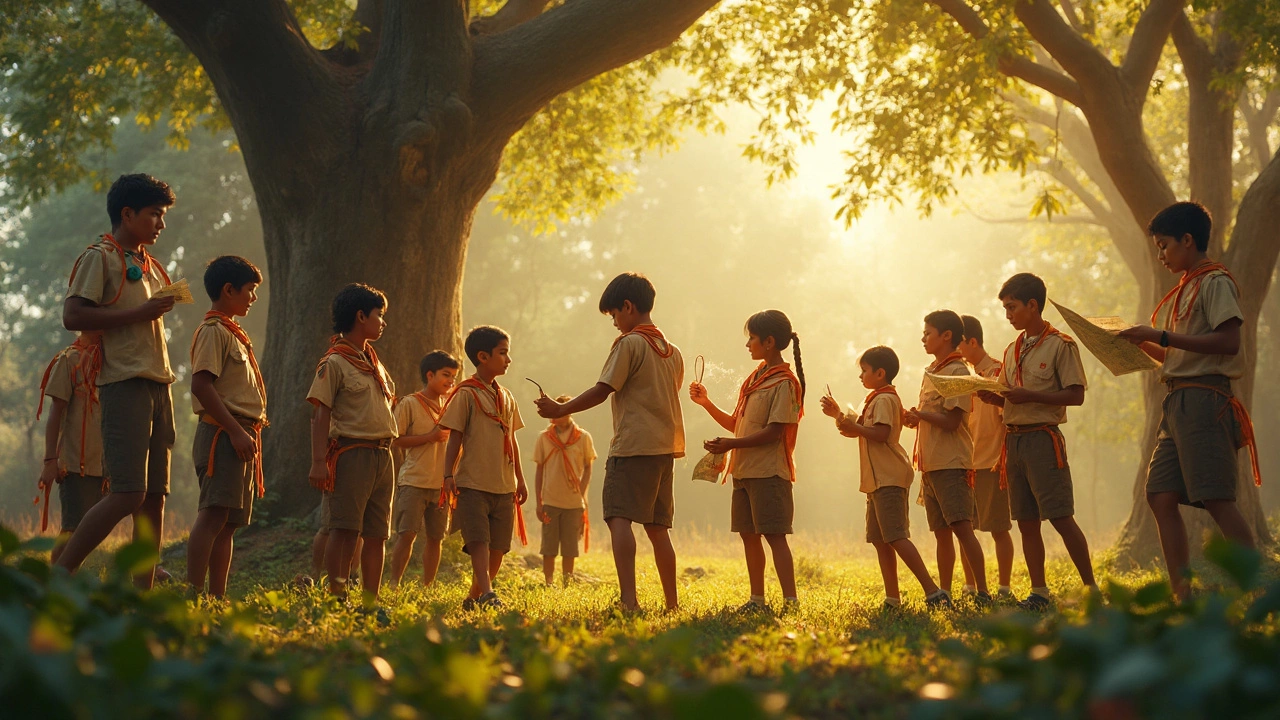When it comes to traditional youth organizations, scouting often springs to mind. Why? It's not just about tying knots or hiking through the woods; it's a way of life for millions around the world. You might know the iconic uniform and the promise to be 'prepared,' but there's so much more beneath the surface.
Scouting began in the early 20th century, thanks to Robert Baden-Powell in the UK, as a program meant to instill values and survival skills. Fast forward to today, and it's still going strong, teaching young people about leadership, teamwork, and self-reliance. Isn't it fascinating how something over a century old can still be relevant? Well, scouting has evolved, embracing technology and adapting to the interests of today's youth without losing its core mission.
- The Origins of Scouting
- Key Values and Skills Taught
- Adapting to Modern Times
- How to Get Involved
- Impact on Youth Development
The Origins of Scouting
Scouting kicked off in 1907 and has been a cornerstone of youth organizations ever since. The mastermind behind all this was Robert Baden-Powell, a British Army officer who saw a need to develop young people's survival skills and character. So, he decided to start an experimental camp on Brownsea Island, rounding up about 20 boys for a week-long adventure. It was a success and marked the birth of the scouting movement.
After that initial camp, in 1908, Baden-Powell published a book called "Scouting for Boys," which quickly caught on. The book laid down the principles of the movement and included practical advice on tracking, camping, and physical health. But more importantly, it emphasized character building, leadership, and community service – all critical elements we see in scouting today.
The Spread of Scouting
By 1910, the idea had crossed borders. The United States, among other countries, embraced it, leading to the formation of the Boy Scouts of America. It wasn't long before scouting spread across continents, resonating with values like duty, honor, and preparedness. This rapid growth was primarily due to its approach of learning by doing, which attracted young minds everywhere.
- 1920 - The first World Scout Jamboree was held in Olympia, London, solidifying scouting's international appeal.
- 1940s - The movement even continued to operate covertly in countries under totalitarian regimes, showcasing its resilient spirit.
- 2007 - To celebrate its centennial, scouts from all over the globe gathered in the UK, reaffirming their commitment to a movement that's been shaping lives for decades.
Through world wars and societal changes, scouting has evolved but never lost its core mission: to prepare young people to be active, responsible citizens. It's pretty incredible when you think about how something started over a century ago is still shaping future generations, isn’t it?
Key Values and Skills Taught
You might think scouting is all about camping and outdoor skills, and you'd be partly right. But there's a lot more to it. One of the core tenets is teaching vital life skills and values that stay with kids long beyond their scouting days.
Leadership and Teamwork
Scouting fosters a sense of leadership and teamwork early on. Kids take on roles that nurture responsibility and help them understand the dynamics of working in groups. They plan activities, lead projects, and learn to manage conflicts—all while having fun.
Outdoor Skills
Yes, it's about being outdoors, and not just in a 'pitching a tent' kind of way. Scouting teaches practical youth activities like navigation, first aid, and survival skills. These aren't just for wilderness enthusiasts; they're practical competencies that build confidence even in everyday life.
Community Involvement
Helping the community is a big part of what makes scouting special. Scouts regularly engage in community service projects, teaching them the importance of giving back and maintaining civic responsibility. They see their efforts making a real difference, which is a powerful motivator.
Environmental Responsibility
Scouting instills a love and respect for nature. Through various conservation projects and educational activities on sustainability, scouts learn to care for the planet, forming habits that promote a greener lifestyle.
These skills make scouting a robust model for traditional youth organizations, standing the test of time. It's all about crafting well-rounded individuals ready to take on the challenges of the world with confidence and respect.

Adapting to Modern Times
The world is changing fast, and traditional youth organizations like scouting have had to keep pace to stay relevant. How tech-savvy is your average scout today? Quite a bit more than you might think! Scouting has embraced digital tools and platforms to enhance the experiences of the young members.
One big update is the use of apps and online programs. These let scouts track their badges, communicate with their troop, and take part in virtual camping experiences. Imagine earning a merit badge through an online course that includes videos and interactive content. Cool, right?
Embracing New Skills
While the core values of scouting remain unchanged, new skills are on the rise. Cybersecurity, coding, and other tech skills are now becoming part of the curriculum in many scouting programs. Learning to code while also knowing how to build a campfire? That's the kind of versatility today's youth need!
Keeping Social Relevance
Thinking inclusivity? Absolutely! Scouting has made strides to be more inclusive, welcoming girls and members of all backgrounds to join and take part in activities. Meetings and events also focus on contemporary issues like environmental conservation and social responsibility, making the organization more connected to challenges kids care about today.
Balancing Tradition with Innovation
It's not all about screens and tech, though. Scouting continues to promote hands-on activities and face-to-face interaction. They've found a way to blend traditional practices with modern tools, showing youth how to thrive in both offline and online worlds.
Technology has also helped reduce the environmental impact of activities. By using e-books instead of paper manuals and holding virtual meetings, youth organizations can reduce their carbon footprint, aligning with their commitment to conservation.
Adapting has ensured that scouting remains not just a pastime, but a life-shaping journey, preparing young people to face an ever-evolving world with confidence and skill.
How to Get Involved
So, you've decided that scouting might be a fantastic fit for you or someone you know. Great choice! Getting involved in the scouting world is easier than you might think. Across the globe, these traditional youth organizations have local groups ready to welcome new members.
Find a Local Troop or Group
One of the first steps is finding a local scouting group. Most countries have national scouting organizations with websites that offer directories or maps to locate nearby troops. A quick online search or visiting the official website of the national organization will usually give you all the information you need. It might be worthwhile to attend a meeting or two before joining. This way, you can get a feel for the group and make sure it's the right fit.
What to Expect
Joining a scouting group usually involves an application process, which is straightforward. You'd fill out a form with personal details, and sometimes there's a small fee to cover membership costs. This fee helps support activities like camping trips and purchasing materials for skill-building exercises. Scouts often participate in a variety of activities designed to teach skills like leadership and teamwork. It's amazing to see young people learn how to navigate the great outdoors while forming lifelong friendships.
Getting Equipped
After you join, you'll probably need to get the necessary attire. The uniform is not just about looking the part—it's a symbol of unity and represents the values of traditional youth organizations. While some might worry about the cost, uniforms can often be found in second-hand stores dedicated to scouting, which makes them more affordable.
Family and Community Involvement
Scouting is not just for the kids; families and communities play a vital role. Many activities encourage family participation and community service. From helping at local events to supporting fundraising efforts, there are plenty of opportunities for everyone to get involved.
Overall, the process of joining and participating in scouting is designed to be inclusive, educational, and enjoyable for everyone involved.

Impact on Youth Development
Being part of a youth organization like scouting can have a huge impact on the growth and character of young people. It's not just about earning badges and learning life skills; there's a deeper level of personal growth at play.
Building Character and Leadership Skills
Scouting is renowned for fostering leadership and character. Through activities that require teamwork and problem-solving, scouts learn to take initiative and lead others. This kind of practical experience is invaluable. They also get frequent chances to think critically and make decisions, which builds confidence and resilience over time.
Promoting Social Skills and Community Involvement
Scouting encourages young people to engage with their communities. Through volunteer work and service projects, scouts develop empathy and a sense of responsibility towards others. These experiences promote strong social skills and a lifelong habit of helping others—which is crucial in today's interconnected world.
Enhancing Practical and Survival Skills
The skills learned in scouting—like camping, first aid, and outdoor cooking—go beyond survival. They instill a sense of self-reliance and adaptability. When scouts know they can handle themselves in various situations, it boosts their confidence in everyday life, whether they're navigating a tough exam or a tricky social situation.
Offering a Safe Space for Growth
Importantly, the scouting environment provides a safe space for kids and teens to test limits, fail, and try again without judgment. This supportive community is where youth can grow into well-rounded adults—independent yet collaborative.
Did you know that studies have shown that former scouts have higher indicators of life satisfaction and civic involvement in adulthood? They tend to be more active in their communities, and are often seen in leadership roles. It's no wonder scouting remains a go-to traditional youth organization for parents wanting to prepare their kids for the real world.





